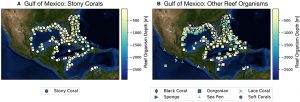
Gulf of Mexico shallow and deep sea coral and sponge sites as reported in the deep sea coral database. Color scale along y-axis indicates depth of reef organism and symbols denote organism type (e.g., scleractinian coral vs. sponge).
If coral reefs are the canary to the ocean’s coal mine, it’s getting awfully bleak in the Gulf of Mexico. A new study by Rice University Earth scientists asserts: Without a rapid and dramatic reduction of greenhouse gas emissions, fragile coral reefs in the Gulf of Mexico, like those around the world, face catastrophe.
That could be bad for us all, said Sylvia Dee, a Rice assistant professor of Earth, environmental and planetary sciences. She and colleagues from Rice, the University of Texas at Austin and Louisiana State University drew their evidence from an extensive analysis of stressors on corals that line the Gulf coast.
They found the majority of shallow reefs along the coast from Texas to Florida are in poor-to-fair condition, and the predicted rise in surface temperatures and ocean acidity will severely degrade what’s left by the end of the century.
The sheer speed of those changes will hamper, if not prevent, the recovery of reefs, some of which began to evolve in the gulf 420,000 years ago, Dee said.
The team’s open-access study appears in an edition of Frontiers in Marine Science dedicated to the past, present and future of Gulf of Mexico reefs.
